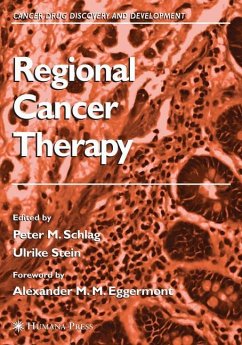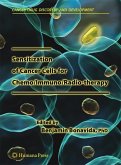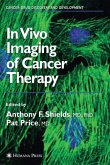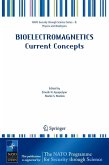Main description:
This book represents a state of the art collection of different approaches for the regional therapy of cancer. It provides an overview of both the basics as well as the applications of regional cancer treatment. The book also covers a broad spectrum of up-to-date protocols for regional therapy of cancer including cutting edge approaches.
Regional cancer therapies remain important options in the management of malignant disease, in spite of the venue of more targeted agents for systemic therapies. New te- nologies and better guidance systems for radiofrequency ablation and intrastitial laser therapies, highly selective intravascular approaches with improved catheters and gu- ance systems, improved agents for embolizations, and new vasoactive drugs for isolated limb and liver perfusions are just a few of the new developments in a field that is alive and progressing. Regional Cancer Therapy, so well put together by the editors Peter M. Schlag and Ulrike S. Stein, presents an overview of today's realities and tomorrow's possibilities. Regional cancer therapy models provide ways to make new discoveries about tumor biology and new agents that may be used regionally as well as systemically. This book should therefore be of interest to all clinicians and scientists with an interest in tumor biology as well as clinical advances. Alexander M. M. Eggermont, MD, PhD Professor and Head of Surgical Oncology Erasmus University MC-Daniel den Hoed Cancer Center Rotterdam, the Netherlands v PREFACE The treatment of malignant tumors has been substantially improved in recent years due to developments in clinical medicine and technology as well as by advances in mole- lar biological research. Modern molecular and genetic techniques allow the charact- ization of molecules that are decisive for tumor development and progression.
This book represents a state of the art collection of different approaches for the regional therapy of cancer. It provides an overview of both the basics as well as the applications of regional cancer treatment. The book also covers a broad spectrum of up-to-date protocols for regional therapy of cancer including cutting edge approaches.
Regional cancer therapies remain important options in the management of malignant disease, in spite of the venue of more targeted agents for systemic therapies. New te- nologies and better guidance systems for radiofrequency ablation and intrastitial laser therapies, highly selective intravascular approaches with improved catheters and gu- ance systems, improved agents for embolizations, and new vasoactive drugs for isolated limb and liver perfusions are just a few of the new developments in a field that is alive and progressing. Regional Cancer Therapy, so well put together by the editors Peter M. Schlag and Ulrike S. Stein, presents an overview of today's realities and tomorrow's possibilities. Regional cancer therapy models provide ways to make new discoveries about tumor biology and new agents that may be used regionally as well as systemically. This book should therefore be of interest to all clinicians and scientists with an interest in tumor biology as well as clinical advances. Alexander M. M. Eggermont, MD, PhD Professor and Head of Surgical Oncology Erasmus University MC-Daniel den Hoed Cancer Center Rotterdam, the Netherlands v PREFACE The treatment of malignant tumors has been substantially improved in recent years due to developments in clinical medicine and technology as well as by advances in mole- lar biological research. Modern molecular and genetic techniques allow the charact- ization of molecules that are decisive for tumor development and progression.








